Key takeaways:
- Photography workshops foster a collaborative environment that enhances skills through hands-on experience and peer connections.
- Participants gain unique perspectives and invaluable feedback, encouraging creativity and growth.
- Key skills learned include composition techniques, manual camera settings, and post-processing, all of which contribute to personal development as a photographer.
- Engaging actively, practicing techniques, and documenting experiences can maximize learning outcomes during workshops.
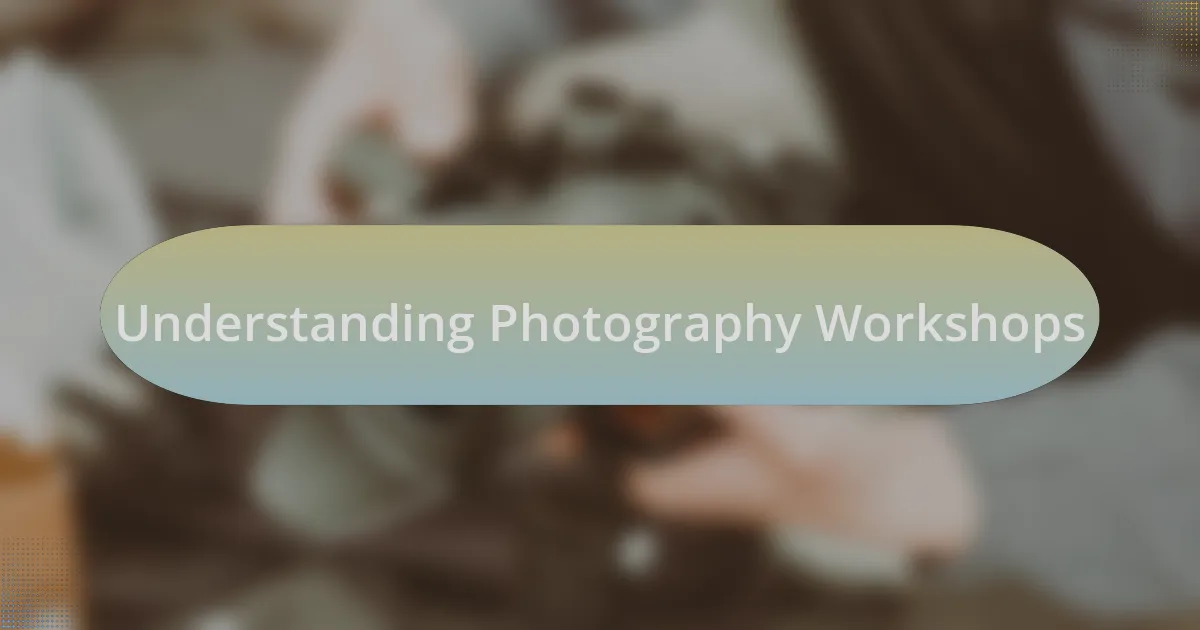
Understanding Photography Workshops
Photography workshops offer an immersive environment conducive to both learning and growth. I remember my first workshop vividly; the excitement of being surrounded by fellow photography enthusiasts ignited a passion I didn’t know I had. Can you recall the thrill of exploring new techniques under the guidance of experienced mentors? That collaborative atmosphere can significantly enhance your skills.
The structure of workshops often balances technical instruction with hands-on experience. My favorite moments were the practical sessions, where we could experiment with different settings and receive real-time feedback. This immediate learning is invaluable; have you ever struggled to grasp a concept until you tried it yourself? There’s something transformative about putting theory into practice alongside others.
As I reflect on the various workshops I’ve attended, I realize that the connections made often extend beyond photography. Sharing our stories, motivations, and struggles created a strong sense of community. Did you feel that these shared experiences can lead to lasting friendships? In this nurturing space, I found not only knowledge but also camaraderie, which can be just as enriching as the photography itself.
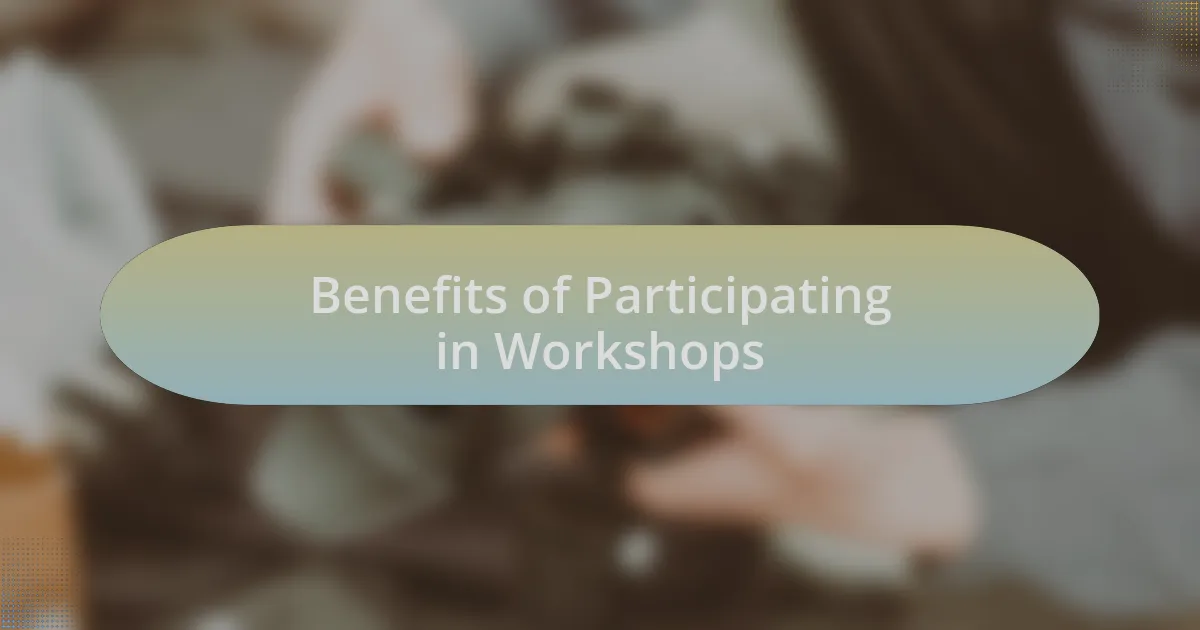
Benefits of Participating in Workshops
Participating in photography workshops opens doors to unique learning experiences that may not be possible in traditional settings. I remember one particularly enlightening session where we ventured outdoors for a hands-on landscape shoot. The fresh air, the sounds of nature, and the shared excitement of capturing the perfect shot made the lessons stick with me far more than any textbook ever could. Have you ever felt that rush when capturing a fleeting moment? It’s in those instances that you truly grow as an artist.
Another benefit lies in the diverse perspectives offered by both instructors and fellow participants. During one workshop, I was paired with individuals from varying backgrounds, each bringing their own distinct vision to the table. This exchange of ideas wasn’t just enlightening; it sparked a creativity I didn’t realize I had. Reflecting on this, have you considered how collaboration can stretch your own creative boundaries? It’s inspiring to see how differently people interpret the same scene, reminding me that there are countless ways to tell a story through the lens.
Finally, the feedback I received throughout these workshops was invaluable. In a supportive environment, critiques felt more like constructive conversations rather than harsh judgments. I vividly recall a moment when my mentor highlighted a specific framing technique that transformed my work instantly. It was eye-opening. Isn’t it wonderful to have an opportunity to improve in a space where everyone is rooting for your growth? That level of encouragement can motivate you to push your boundaries like never before.
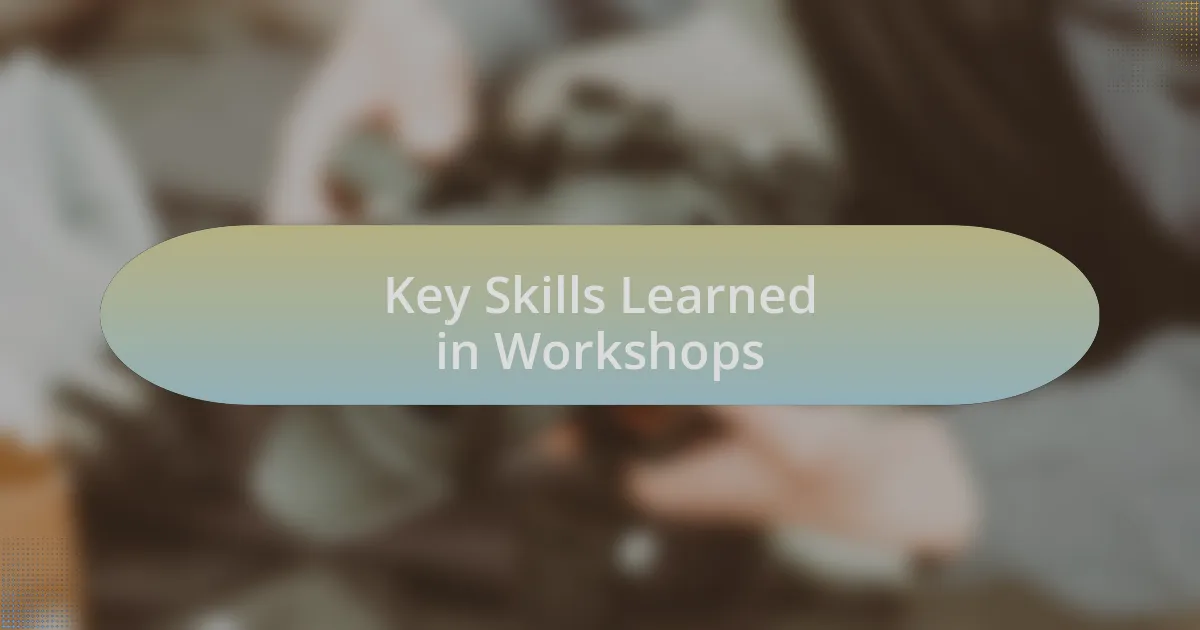
Key Skills Learned in Workshops
One of the key skills I honed during workshops was mastering the art of composition. I recall a session where we were challenged to shoot in different lighting conditions. Each frame we captured led to discussions about balance, lines, and focal points. I found myself more aware of how these elements could either enhance or detract from a story. Isn’t it fascinating how shifting your perspective can completely change a photograph’s impact?
Technical skills were also a major focus. In one workshop, we delved into the intricacies of manual camera settings. The moment I transitioned from auto to manual mode felt like stepping into a new world. I began to understand the relationships between aperture, shutter speed, and ISO. This newfound knowledge not only empowered me but also gave me more confidence in my ability to face varying shooting situations. Have you ever experienced that rush of taking control of your camera and creating exactly what you envisioned?
Lastly, learning about post-processing proved to be a game changer for me. During a session dedicated to editing, I was introduced to various software tools that brought my images to life. I remember feeling a mix of excitement and anxiety as I experimented with adjustments for the first time. That sense of discovery while fine-tuning colors and contrast was addictive. How many of you have felt that thrill in the editing room, knowing you can elevate your photographs in ways you never thought possible?
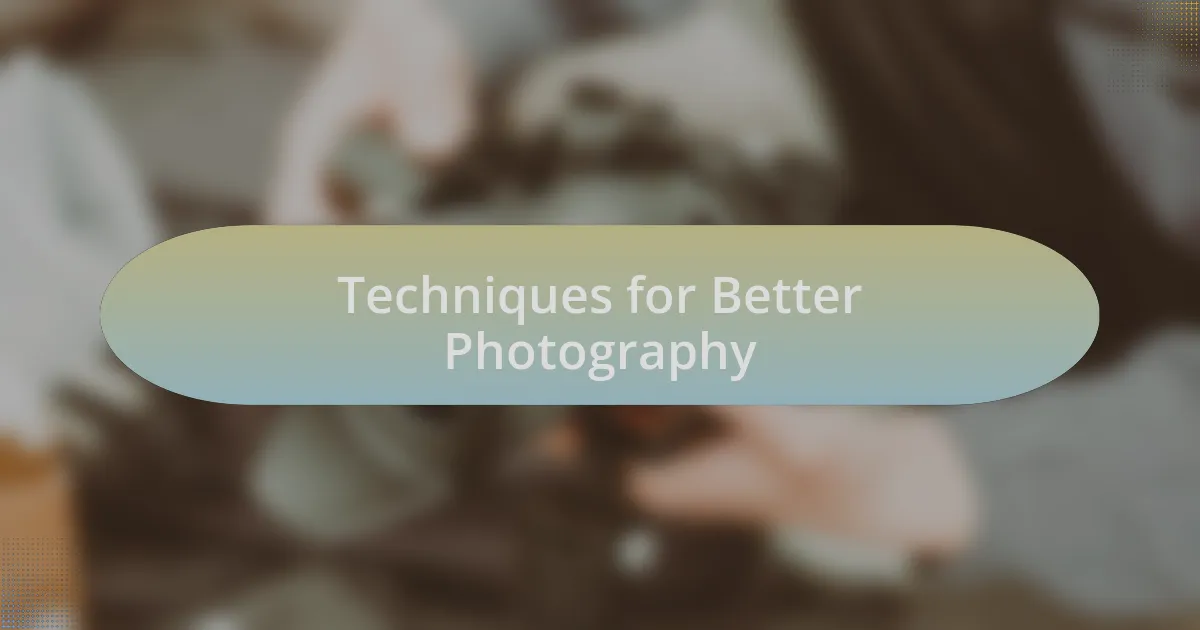
Techniques for Better Photography
When exploring techniques for better photography, I learned the power of lighting firsthand. During one workshop, we ventured outside at sunset, and I was amazed at how natural light transformed our subjects. I remember shooting a portrait, and as the golden hour bathed everything in warm hues, it clicked for me—lighting can be the difference between a good shot and a breathtaking one. Have you ever noticed how the right light can evoke emotions in a photograph?
Another important technique I grasped was the use of leading lines. I recall a particularly inspiring exercise where we were asked to find pathways or natural lines in our environment to draw the viewer’s eye. As I framed my shots, I began to appreciate how effectively lines could guide the viewer’s focus to the main subject. It’s almost like creating a visual journey; don’t you feel more compelled to explore an image when your eyes naturally follow a path?
Lastly, I learned the significance of the rule of thirds, a fundamental yet powerful composition technique. One workshop involved dividing our viewfinder into a grid and placing subjects along those lines or intersections. This simple adjustment propelled my creativity, leading to more dynamic photographs. The thrill of breaking traditional composition rules gave rise to some of my favorite shots. Have you ever tried experimenting with your composition—did it change how you saw your subjects?
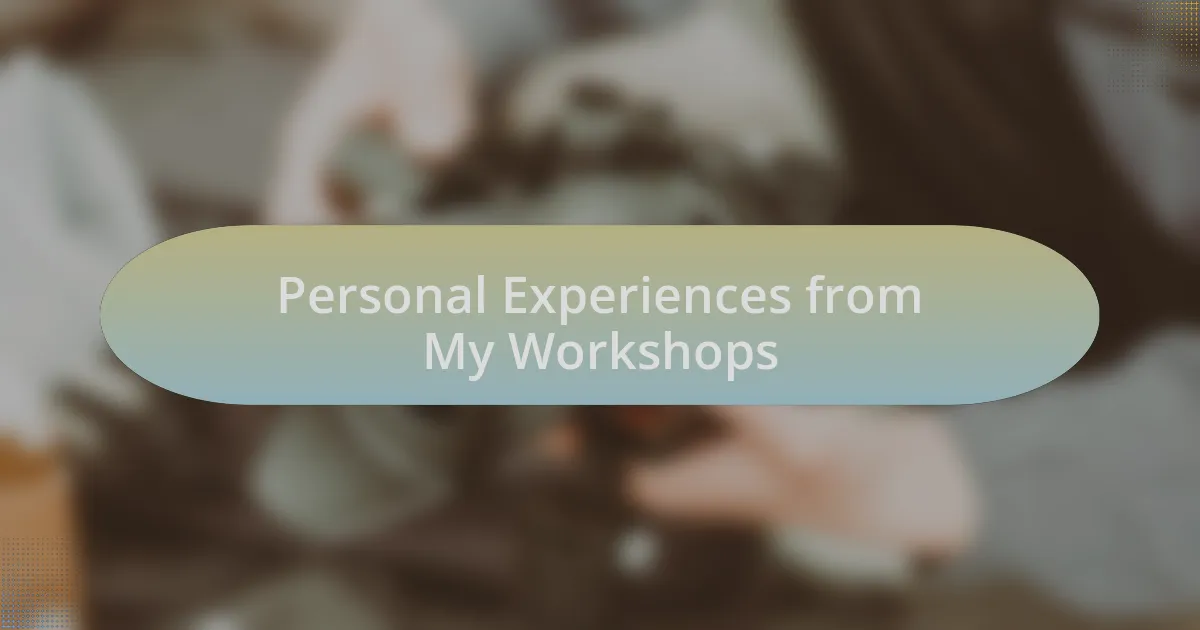
Personal Experiences from My Workshops
In one of my workshops, I had the opportunity to explore macro photography. It was a revelation! As I crouched low to capture the intricate details of dew on a leaf, I felt like I was discovering a hidden universe. Who knew that something so small could hold such beauty? That experience taught me to appreciate the little things in life, reminding me that every moment, no matter how seemingly insignificant, can be truly stunning.
During another session, we focused on portrait photography, and I remember working with a model who was initially shy. As I chatted with her and adjusted my lens, I noticed her confidence blossoming. The laughter that followed seemed to ignite a spark, capturing genuine emotions in my photos. This moment drove home the point that connecting with your subject is just as important as technical skills. Have you ever seen how a smile can illuminate a whole photograph?
One of the most eye-opening experiences came during a nighttime photography workshop. Armed with a tripod, I explored long exposure techniques in a city filled with vibrant lights. I was captivated by how motion blurred in the frame created a sense of life and energy. That night, I learned to embrace experimentation. The thrill of capturing stories through light and time filled me with creative excitement. How often do we allow ourselves to step out of our comfort zones and explore the unknown?
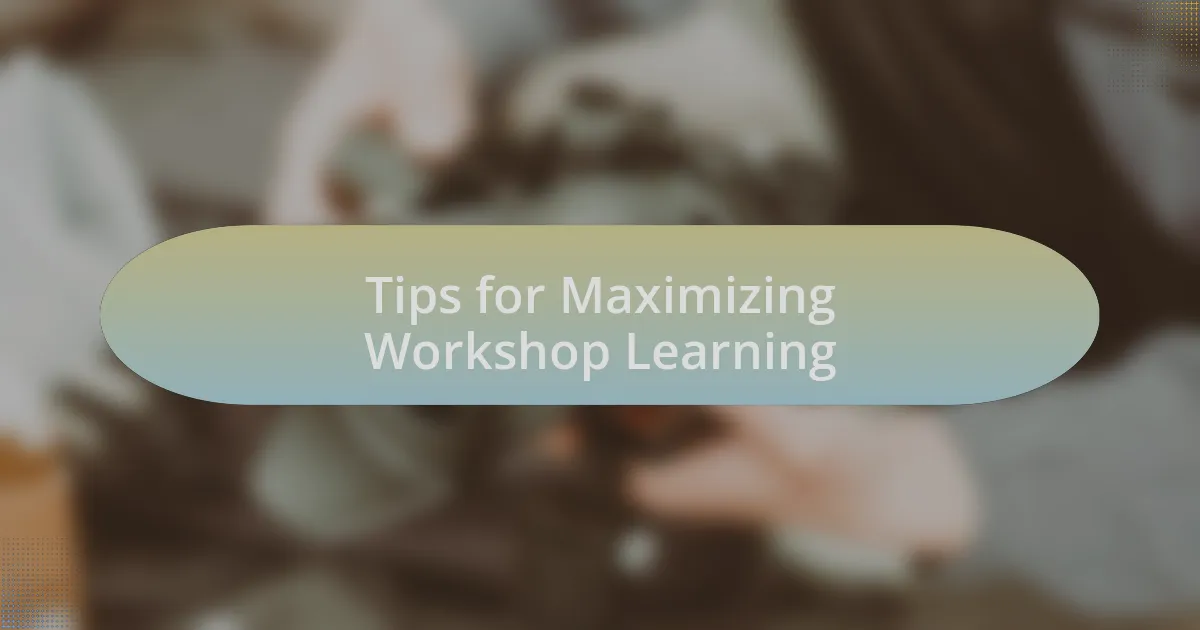
Tips for Maximizing Workshop Learning
One powerful tip for maximizing your workshop learning is to actively engage with your instructors and fellow participants. I recall a moment in a landscape photography workshop when I approached the instructor with a question about composition. The discussion that followed not only deepened my understanding but also fostered rich conversations with others eager to share their insights. Have you ever noticed how collaborative learning can open up new perspectives?
It’s also essential to practice what you learn during the sessions. In a lighting workshop, we were encouraged to experiment with different setups. I took it to heart and spent extra time tinkering with various angles and light modifiers. By the end of the day, I not only honed my skills but also gained a newfound confidence. How often do we seize the moment to apply knowledge immediately?
Lastly, don’t forget to carry a journal or sketchbook to jot down ideas and reflections. After a workshop on abstract photography, I found that writing down my thoughts helped solidify the concepts in my mind. It became an emotional outlet as I captured my creative journey. Have you considered how documenting your personal insights can enhance your growth as a photographer?